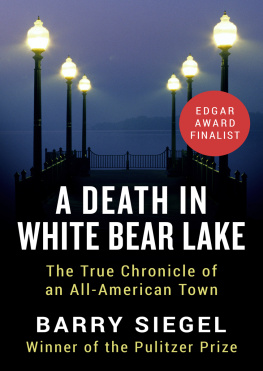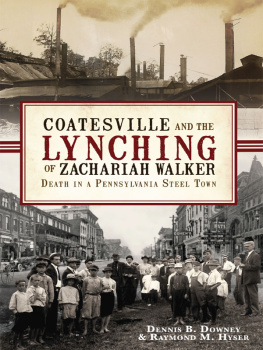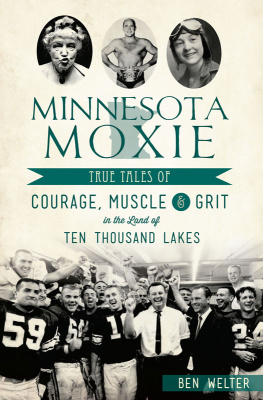A Death In White Bear Lake
The True Chronicle of an All-American Town
Barry Siegel

To Marti
for Everything
CONTENTS
PART ONE
Voices from the Past
CHAPTER 1
Memories
Months later, in the airless cubicles of the solitary police station where White Bear Lake detectives do their business, there was confusion among some of them about just what they truly recalled of the Jurgens case on that damp September day in 1986 when Jerry Sherwood first appeared, demanding their attention.
I didnt remember anything about the case, I just remembered White Bear was flooded that spring, Detective Ron Meehan, the departments chief investigator, initially told those who asked. I listened to her story and it didnt ring a bell, Lieutenant Clarence Buzz Harvey agreed. For a while, Harvey even went so far as to suggest hed been a rookie cop in 1965, although the records would show that claim to be something of a stretch, since by then Buzz had been on the force a good six years. Chief Philip Major, only a high school senior that year, remembered volunteers frantically sandbagging the rampaging Mississippi and hymn-singing civil rights demonstrators marching up Cedar Street in downtown St. Paul, but of course he recalled nothing of the Jurgens case.
Then, as time went by, the stories evolved. Buzz Harvey acknowledged, a little sheepishly, that yes, hed been aware of the case from the start. Ron Meehan allowed that everyone knew, but it was none of our business. Gerry Sarracco, the dispatcher on the critical Palm Sunday morning in 1965, said, We all knew something was wrong, but we didnt know what.
Just as these mutating versions of distant memories were understandable considering the passage of time, so too were the hazy recollections about more recent days. The prosecutors and police and doctors, after all, could hardly be expected to know theyd later be asked to account for every move, moment by moment, during those pivotal hours following Jerry Sherwoods first appearance. All the same, studying the faces of those involved, watching them aimlessly shuffle papers across their desks, it did sometimes seem their murkiness had as much to do with a certain nervous reluctance as with simple forgetfulness.
That too was understandable.
This much can be saidit was midmorning on Thursday, September 11, 1986, when Buzz Harvey looked up from his desk to find the stations office clerk standing in the doorway of his small office.
Someone called while you were out, wanting to talk to you, Heidi Riemenschneider reported. Something about his brother being murdered. Said he would call back later. His name was Dennis Craig McIntyre.
Buzz Harveys eyes traveled to a dog-eared manila file cradled in her right arm. He raised his eyebrows in inquiry.
Oh yeah, she said, placing the file on Harveys desk. The guy mentioned something about a Jurgens case. Happened twenty-one years ago. I pulled our file. Thought youd want to see.
Alone again, Harvey considered the closed file before him, shutting his eyes as an unwelcome feeling took hold. Yes, he remembered the Jurgens case. A little boy had died.
Harvey had never seen the file that sat before him. Two other officers had handled the Jurgens case in 1965, Pete Korolchuk and Bob VanderWyst, both now retired. What Harvey recalled came from them. Korolchuk, he remembered, had talked back then of certain pressures and problems connected with his investigation, but what exactly had happened Harvey could not say. Hed been busy with his own work and it had not been his case.
Harvey labored to concentrate. Hed recently given up a lifetime of smoking, and now longed for a cigarette. The sausage pies across Highway 61 at the Pizza Hut that hed turned to as a substitute filled his considerable gut without at all soothing his nerves. Slowly, Harvey opened the Jurgens file and began to leaf through the pages.
As he did so, the unwelcome feeling sharpened and tightened. There was something strange here. Mr. and Mrs. Ivan Demars have given us a signed statement. Mr. and Mrs. Lloyd Zerwas have given us signed statements also, Pete Korolchuk had written. But Buzz could find no such statements in the file. He continued turning the pages, his concern mounting. The police logs seemed riddled with discrepancies. Harold Jurgens told VanderWyst that his little boy had fallen and struck his head on the floor, but the autopsy report mentioned head-to-toe bruises. So many bruises from a fall on the floor? The doctor at the death scene told VanderWyst he noticed bruises just on the forehead, since he only checked the boys chest and face. Why wouldnt the doctor look at the body under the blankets? When Buzz reached the files last sheet he stared at it, then shuffled back through the pages, searching in vain. Where was the ending? Thered been no prosecution, no disposition at all of this case. What had happened?
And who now was asking about the case? The call had come from a Dennis Craig McIntyre. What did he have to do with this?
Buzz called Ron Meehan into his office.
Remember the Jurgens case? the lieutenant asked.
Meehan, a former Marine M.P., college football player, and amateur boxer, was a brawny man with a barrel chest and muscular arms. Then fifty-one, hed been a White Bear Lake cop for twenty-five years and the departments chief investigator since 1973.
Meehan merely nodded. Yes, he remembered the Jurgens case. Hed never forgotten the Jurgens case.
Somebody called about it, Harvey said. Told Heidi he was a brother to the dead boy. Said hed call back. Ill keep you posted.
The call came four days later, late in the afternoon on Monday, September 15. The voice was young, unpolished and hostile. Dennis Craig McIntyre told Harvey he was calling for his mother. Her name was Jerry Sherwood.
We want to talk to you about my brother who was murdered twenty-one years ago, McIntyre said. Can we come in now?
Harvey glanced at the clock on his wall. He worked an eight to four shift, and it was nearly four oclock.
Im only here until four, Harvey said.
Oh shit, McIntyre said.
Harvey was taken aback, but in the coming days, he would hear that expression more than once from McIntyre.
Ill call back tomorrow, the young man said.
Tuesday passed, though, without a call. Harveys phone finally rang late on Wednesday afternoon. Can we come in tomorrow morning? McIntyre asked.
Harvey looked at his calendar. That would be Thursday, September 18. Yes, fine, he said. Make it at ten in the morning.
It is possible to drive through White Bear Lake without noticing either its charm or its lake. Due in good part to the arrival of interstate highways, the town of twenty-two thousand qualifies as what the urban planners call a second-ring suburb of St. Paul, the Minnesota capital, which rises ten miles to the south. I-35E carries commuters north from downtown St. Paul to westbound I-694. State Highway 61, an exit off 694, carries commuters north again through White Bear Lake.
Highway 61 is a four-lane divided thoroughfare that offers little to please the eye. Approaching the town from the south, the road passes three gas stations, a Wendys, a McDonalds, a Dairy Queen, the Polar Chevrolet and Tousley Ford car dealerships, a Jiffy Print, a Two Guys from Italy restaurant, the Johnson-Peterson Funeral Home, a liquor store, and dozens of small shops offering wares ranging from live bait to video rentals. Only by looking alertly to the right while negotiating Highway 61 can you catch a passing, fragmented glimpse between buildings of the sparkling-clear twenty-five-hundred-acre lake that forms the citys core. To discover the relatively bucolic villagelike town center hugging the lakes southwestern shore, you would need to turn right off Highway 61 at Fourth Street. There, a quiet retail quarter offers a tableau less jarring to the eye, at least to those who do not mind the sort of stores that go by names such as Country Goose or The Sheepy Shop or Timberdoodle. Just beyond the business district, on winding Lake Avenue, a row of gracefully weathered frame houses faces the water, one-time summer cottages expanded over time into stately, picturesque homes. An arched bridge off Lake Avenue connects the mainland with the even more affluent Manitou Island, a green and richly wooded enclave of baronial mansions. Most days in the summer, sailboats and fishermen move languidly about the lakenot vacationers but neighbors, stealing an hour or two of pleasure before or after work.











